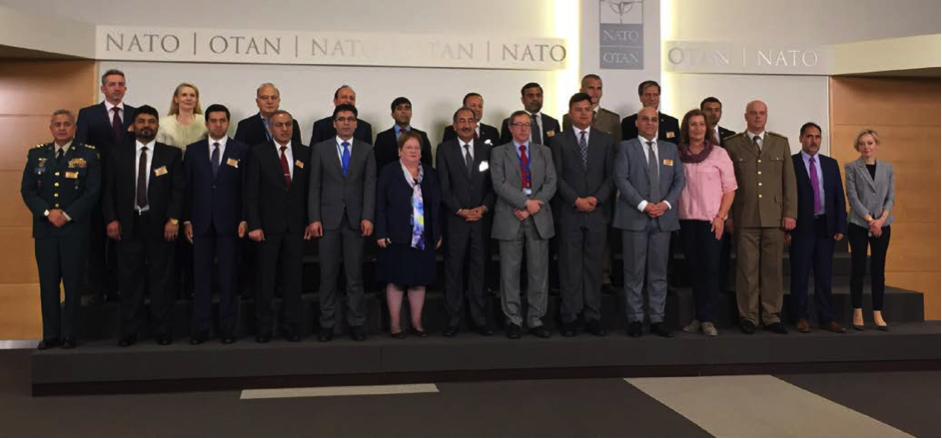NATO’s Building Integrity (BI) policy promotes good governance and principles of integrity, transparency and accountability in the defence and security sector. The BI Policy recognizes that poor governance and corruption increases security challenges faced by nations and partners alike. Corruption is recognized as a major driver of insecurity and can directly or indirectly facilitate a landscape sensitive to extremism and terrorism. As a result of its importance, NATO’s BI policy is streamlined into NATO’s three core tasks: collective defence, crisis management and cooperative security. At the 2016 Warsaw Summit, Heads of State and Government endorsed the NATO BI Policy in an effort to “strengthen good governance principles and practices, and reduce the risk of corruption in the defence and related security sector”. Within the framework of the BI Policy and Action Plan, NATO works to support Allies and partner countries to encourage good practices in defence institutions. This support can be extended through education and training, strategic advice, and peer-to-peer consultations. What makes the NATO BI Programme especially unique and credible is that activities are not only open to partner nations, but also NATO allies themselves. The BI policy recognizes that improvement in the defence sector is not only limited to countries with fragile institutions but NATO allies as well. As of December 2018, 9 allies and 11 partner nations are recipients of tailored programmes to enhance their sectors. The nations that are engaged include: Afghanistan, Armenia, Bosnia and Herzegovina, Bulgaria, Colombia, Croatia, Georgia, Hungary, Jordan, The Kyrgyz Republic, Latvia, the Republic of Moldova, Montenegro, Norway, Poland, Serbia, the Former Yugoslav Republic of Macedonia, Tunisia, Ukraine and the United Kingdom. NATO’s BI program also works with The Global Organization of Parliamentarians Against Corruption (GOPAC). GOPAC is an International nongovernmental organization made up of parliamentarians from across the globe, working together to combat corruption and promote good governance. The global secretariat is located in Ottawa.
The NATO BI Policy and Action Plan is managed by the NATO International Staff. The section which is under the umbrella of the Political Affairs and Security Policy Division is spearheaded by Canadian Senior Officer Susan Pond. [1]Ms. Pond chairs the NATO BI Task Force and works closely with the NATO Military Authorities. The NATO BI toolkit and working mechanism is open to all allies and NATO partners. It voluntary and request based. The first step in the process includes the requesting nation to fill out a Self-Assessment Questionnaire. The questionnaire is a diagnostic tool and helps create an individual tailored plan. Moreover, the questionnaire provides nations and the BI taskforce an idea of the current state of structures and capacities. The questionnaire addresses a wide range of areas from anti-corruption laws in the respective nations to personnel and training.
The Impact of NATO BI
It has been ten years since the launch of BI and there have been a number of considerable results. An independent review of NATO BI carried out by the Stockholm International Peace Research confirmed that BI has achieved the following: 11 nations have introduced changes in legislation, 12 nations have introduced new business practices, 15 nations have introduced new education and training requirements, and 16 nations have introduced permanent structures. Moreover, the main findings concluded that the “programme is viewed as necessary and highly beneficial by many stakeholders and participating states”.
The importance of BI
Incorporating the BI policy throughout NATO’s mechanism and machinery for NATO allies and partners will enhance operational efficiency and reduce risk for personnel. Corruption and poor governance has been a main contributor to a number of emerging security challenges faced by the Alliance and partners. From the rise of Boko Haram to the unprecedented movement of refugees and migrants across the Mediterranean, poor governance has been a culprit in each security challenge. In Iraq, Immediately after the US withdrawal in Iraq in 2011, inadequate governance strengthened ISIS. The Iraqi government began to target Sunni elites on charges of affiliation with the outlawed Baath Party. This was the prelude to the ‘Debaathification movement’ which resulted in the firing of over 400,000 Sunni individuals. It was quickly identified that ISIS was developed as the central opposition force to undermine Maliki’s government. It soon became clear that former Baathists were providing significant support to ISIS’s operations in Iraq. The disbanded Sunni Baathist would come to play a pivotal role in the rise of ISIL in Iraq. In addition, the role of ghost soldiers also significantly strengthened ISIS’s mobility and efficiency. The Iraq army was weakened from within by corrupt soldiers. It is estimated that 50,000 soldiers failed to show for duty. Former Prime Minister told Iraqi Parliament that four divisions of the army were severely impacted by ghost soldiers.
Iraq has been engaged with NATO BI since May 2017 following a request form the Ministry of Defence for support in anti-corruption. In 2018, responding to a request by Iraqi authorities, three Civil Military Cooperation workshops were devoted to BI and Good Governance. These activities provided an opportunity to involve key leaders on BI and to introduce the NATO BI to the Iraqi government.
The future of BI
In December 2018, NATO BI entered its fourth phase. BI 2019-2022 will focus on enhancing and upgrading engagements and increasing activities with allies and partners. As part of the NATO-EU Declaration, the EU has announced its decision to make a financial contribution to the NATO BI Trust Fund – the Trust Fund is one way BI supports its activities. The implementation of BI and mainstreaming BI into policies and doctrine will strengthen good governance principles and practices, and diminish the risk of corruption in the defence sector. In the long run, this will play a pivotal role in reducing some of the security challenges faced by both allied members and partner nations. Fractured governance has facilitated the rise of terrorist groups. From Libya to Iraq, weak and splintered governance has created fertile breeding grounds for brutal militias. Building integrity and promoting good practices in good governance can insulate the defence sector from corruption and thereby provide for a safer world for both the Alliance and partners.
[1] Ms. Pond has more than twenty-five years’ experience at NATO and in the Canadian Public Service advising on policy to build capacity in the defence and related security sector.
Disclaimer: Any views or opinions expressed in articles are solely those of the authors and do not necessarily represent the views of the NATO Association of Canada or NATO.




